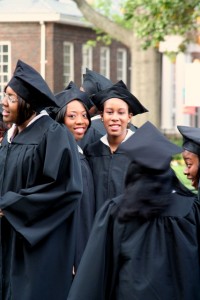
Black women doubled their college participation between 1971 and 2005. However, graduation rate successes have not always followed the increase in participation rates. To explore this further, Rachelle Winkle-Wagner investigated the state of research on college success for Black women by reviewing relevant literature and identifying both how Black women in college have been studied and what kind of information results from these studies.
Winkle-Wagner examined 119 studies on African American undergraduate women’s experiences after enrolling in college. The studies she examined ranged across disciplines and methods. In the review, Winkle-Wagner identifies three primary ways in which Black women’s lives have been narrowed down in research: 1) individual factors are overemphasized, 2) analyses tend to focus on Black women as a homogenous group, and 3) completion of a degree program is often the only indicator of success.
Even when studies focus on relationships or institutions rather than individuals, Winkle-Wagner argues that these studies still focus on relationships between two actors (individuals) or Black women’s need of institutional support to fill in gaps or deficiencies. While much research has highlighted Black-White comparisons, these studies reify White as the standard and again suggest Black students need to measure up to White students’ successes.
Winkle-Wagner provides a number of suggestions for further research. Quantitative studies should include multilevel analysis to reveal more about intersections of race and gender, sexuality, immigration status, etc. Likewise, qualitative studies should focus on differences within Black women college students. In addition, Winkle-Wagner calls for further research on the influence of peers, parents, and mentoring on Black women’s success in college.
Read the full article here:
Winkle-Wagner, Rachelle. 2015. Having Their Lives Narrowed Down? The State of Black Women’s College Success. Review of Education Research 85(2): 171-204.
Allison Nobles is a graduate student in Sociology at the University of Minnesota who studies gender, sexuality, and violence. Follow me on Twitter @Allison_Nobles.




Comments